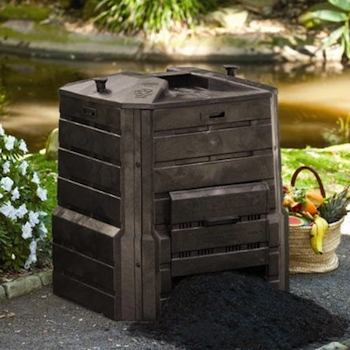Compost Container
As mentioned in an earlier article, getting started in composting can be as simple as creating a freestanding compost heap or burying your organic waste underground.
Both are inexpensive (ok, free) methods to familiarize yourself with the composting process, but you may opt for using a compost container to keep things under more control.
Advantages of a Compost Container
Putting your organic waste into a compost pile is really just a way for you to help Mother Nature speed along what she does quite well on her own.
A freestanding compost pile or underground composting work quite well, but there are several reasons why composting in some type of container may be the better option for you.
Here are a few examples:
- While they may be beautiful to you, your neighbors may not appreciate seeing piles of freestanding compost in your yard. A compost container can keep nature's miracle process hidden from view and help you avoid your neighbor's wrath.
- A compost container will obviously keep the dry organic materials in your compost pile, such as straw or leaves, in one place. In a freestanding compost pile, this material has a tendency to scatter in high winds.
- Containing your composting material will make keeping pests away a much easier proposition, especially a container with a secure lid and enclosed sides.
- Using a compost container will be more efficient, since keeping the size and shape of your original pile of material will be easier inside the container. This allows the composting material to have sufficient mass and be better able to self-insulate to maintain optimum moisture levels and higher temperatures, both of which speed the composting process along.
- An enclosed compost container will allow the composting material to retain moisture. This is especially helpful in very hot and dry areas, since dried-out composting material will slow down (or stop) the decomposition process.
- On the other hand, in areas that receive lots of rain, an enclosed compost container will also keep rain from making the composting materials too wet, which can create a stinky situation.
- A compost container will usually offer better insulation, which will help to increase the interior temperature, and maintain it over time.
As you can see, using a container for your composting will give you much more control over the entire process. It's simply much easier to maintain and manipulate the conditions for creating compost out of your organic waste materials if they are contained rather than sitting out in the open, exposed to variable weather conditions and animal pests.
If you've decided to keep your compost in a container, the question now is, what kind of container? There are lots to choose from, and what you choose will depend on how much organic material you'll be composting, how much money you want to spend, how much space you have, and simple aesthetics (visual appearance).
We'll take a look at several types of compost containers, from bins to tumblers to kitchen composters, in separate articles.
Interested In More On Composting?
We offer a lot of information on composting and some great composting product reviews. If you really want to get your feet wet in the composting business, be sure to read these additional articles of interest:
Composting 101
Worm Composting
Vermiculture - A Worms Healthy Home
Vermicomposting - Troubleshooting Tips
Compost Pit
Compost Container
Making Compost
Soil Saver Classic Composter Product Review
GeoBin Composting Container Product Review
Worm Factory 360 Product Review




































































